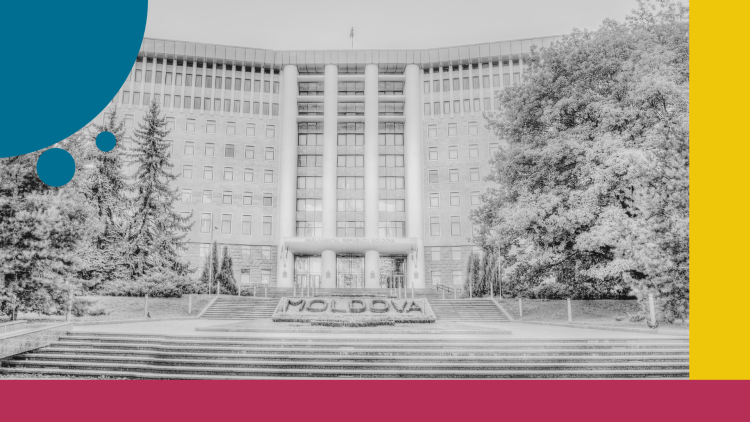
Civil society is highly concerned about the proposal of a Foreign Agents Law in Moldova. It reflects a broader regional trend of initiating or adopting restrictive laws, designed to undermine and attack CSOs. The Bloc of Communists and Socialists, in opposition in the Moldovan Parliament, introduced the draft law, which is unlikely to be adopted by the pro-European majority. Still, it poses a significant threat to civil society's work and democratic principles, especially ahead of the Parliamentary elections scheduled for autumn of 2025.
A restrictive draft Foreign Agents Law: Threat for civil society operation
On March 27, 2025, the opposition faction, the Bloc of Communists and Socialists, submitted a draft Foreign Agents Law to the Parliament.
In the absence of any impact assessment on the necessity of this law, the problem it aims to address and its impact over different groups, the rationale of this draft law, as outlined in the supporting note, is weak and broad only referring to the increasing globalization and the growing involvement of international organisations and foreign actors in the socio-political life of the Republic of Moldova, and also referring to the argument on protection of national sovereignty, as usually used with such restrictive initiatives.
The opposition in the draft law introduces several problematic provisions around:
1) Unclear effect on entities (including civil society), and freedom of association, due to broad criteria and burdensome registration rules. The main terminology used in the draft law is broad:
- Foreign agent - any legal or natural person receiving at least 50% of its annual income from foreign funding and engaging in activities that influence the political, economic, social, or educational landscape of the Republic of Moldova.
- Foreign funding - any material or financial resources received from foreign governments, international organisations, or non-resident individuals and legal entities.
- Influence activity - any action aimed at influencing political, legislative, or electoral decisions or shaping public perception on national interest topics.
Foreign agents’ would have to undergo Mandatory registration within 30 days of receiving foreign funding, submit quarterly reports on the use of foreign funds and activities conducted, and label public materials (websites, brochures, advertisements, media campaigns) with the statement: ‘This entity is registered as a foreign agent in the Republic of Moldova.’ This would stigmatise CSOs and significantly hinder their activity. It would create a restrictive operating environment for CSOs, imposing administrative burdens to meet these requirements, penalties or even suspension if failing to comply. Moreover, it would undermine the financial instability and restrict the activity of CSOs working on governance, human rights and democracy. It would also bring negative perceptions and discourage public engagement with the CSOs sector.
2) Restriction on legitimate activity and basic freedoms
Such registered entities would further:
Be prohibited from financing political parties, electoral candidates, or campaigns in Moldova;
Be prohibited from engaging in lobbying for foreign interests without informing the Committee;
Only be allowed to participate in educational programs with approval from the Ministry of Education and the Committee for Foreign Influence Control. Such limitations might infringe on the legitimate right of individuals and organisations to monitor elections, engage in decision-making processes, or to promote protection of human rights and democratic institutions.
3) Burdensome activity reporting, control measures and sanctions
The draft law proposes a body responsible for monitoring, supervising, and enforcing this law to be the Committee for Foreign Influence Control (consisting of 7 members), with powers to:
Manage the Foreign Agents Registry;
Monitor compliance with the law;
Impose sanctions for violations;
Issue annual reports;
Conduct annual and unannounced inspections.
The sanctions by the Committee include written warnings, fines, suspension of activities for up to six months and dissolution by court ruling.
In the supporting note, the authors claim that the aim of this draft law is not to restrict the activities of non-governmental organisations or international partnerships but to introduce transparency measures similar to those applied in United States (Foreign Agents Registration Act - FARA, 1938), Australia (Foreign Influence Transparency Scheme Act, 2018), Israel, France, and Germany.
Key concerns
In essence, the draft law is designed to silence independent voices and close civic space. The draft law would significantly affect legal and financial viability of CSOs, their reputation, public support and their ability to fulfil their role in a democratic society. It would effectively exclude CSOs from political and civic life, which violates freedom of association, freedom of expression and right to participation in decision making. This undermines democratic governance and limits the watchdog role that civil society plays.
Civil society is aware that such draft law is not a novelty when it comes to fostering hostility towards CSOs within the illiberal political spectrum. Recent LRCM Radiography of attacks on CSOs and Human Rights Defenders in Moldova shows that CSOs have consistently been the target of smear campaigns and SLAPPs. However, this draft Foreign Agents Law goes beyond a mere hostile attitude and raises concerns among civil society. With the 2025 Parliamentary elections approaching, civil society and the EU should closely monitor and take action against this restrictive initiative, particularly considering the experience of abuse of such laws in other countries such as Hungary or Georgia, to crack down on civil society and limit civil society freedoms.
